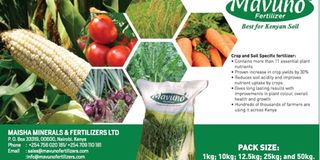Having productivity troubles on the farm? See what experts recommend and why Mavuno Fertilizer fits in
Sponsored by Maisha Minerals and Fertilizers Ltd

By Faith Nyamai
So much about climate change. Rainfall has become erratic, confusing farmers who for ages, have been used to growing particular crops during specific seasons.
Add that to shrinking land sizes, and farmers are frantically trying out ways to boost yields. The trouble is, many of them apply fertilizers without much caution as to whether the type they are using is the best option for their soil.
In short, agriculture in Kenya, much of it dependent on smallholder family managed farms, could do with some research-based improvement and proper guidance to producers.
Agricultural experts are recommending what they call Integrated Soil Fertility Management (ISFM). This is a set of practices related to cropping, fertilizer application, use of organic resources and other amendments to increase input use efficiency and output.
The ISFM delivers productivity gains, increased resilience and offers climate change mitigation. It reduces greenhouse gas emissions. Call it climate-smart agriculture.
When the rains are not enough, experts advise farmers to use ISFM approaches because exclusive use of inorganic fertilizers negatively affects the physical properties of the soil, including its water holding capacity.
Talking of fertilizers, the Mavuno Fertilizer brands are said to come with unique properties. They balance soil PH. They come in different blends and are crop-specific. They are designed to replace nutrients removed during harvest and based on crop response to nutrients.
The manufacturers – Maisha Minerals and Fertilisers Ltd – continually conducts on-farm trials in its intense research and development practice.
Mr Douglas Mwagwi, the company’s business development manager, says Mavuno Fertilizer brands are special because they are crop-specific in terms of nutrient requirements. “This is unlike many others that may have nutrients which the crop doesn’t need and they end up polluting the soil,” he stresses.
Mwagwi says Mavuno fertilizers contain variety of minerals necessary for optimum plant growth, and are capable of increasing harvest by up to 30 percent.
Each Mavuno Fertilizer type has nutrients that are specific to crop requirements. The fertilizers are designed to release the necessary nutrients at specific periods during the various stages of plant growth. They are high-quality blends of macro and micronutrients. “They are trusted for all kinds crops, from maize, wheat, barley, beans, bananas and potatoes, to coffee, tea, rice, sugarcane and tobacco,” says Mr Mwagwi.
He then advises: “It’s good to understand the type of soil you have as a farmer and the crop you are planting. The type of fertiliser you use will depend on the content of the soil, which is understood after a soil test is done.”
Mwagwi says that Mavuno fertilizers are friendly to the environment as they help to facilitate nitrogen fixation and reduce soil acidity.
By increasing the PH of soil to the optimum levels of 6.0-6.5, Mavuno Fertilizer brands neutralise the acidity caused by nitrogenous compounds, eliminate the toxic effects of aluminium and increase crops uptake and absorption of essential nutrients.
“The presence of calcium and magnesium in all Mavuno Fertilizer types is scientifically proven to improve yields, soil fertilizer and produce strong and healthy crops,” says Mwagwi.
The fertilizers come in packs of 50kg, 25kg, 12.5kg and 1kg.

